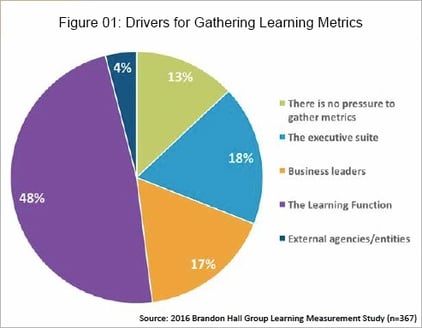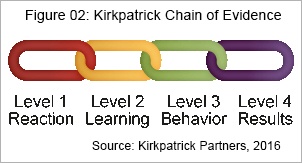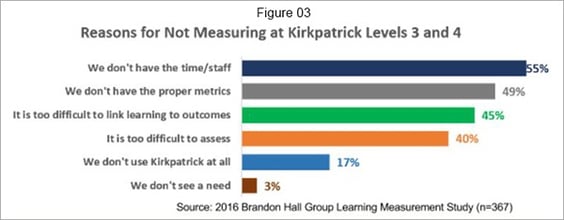
A recent report from Brandon Hall Group on alignment and measurement of learning paints a grim picture. Researchers found only 6% of organizations link learning to business results, and most don’t even try to measure it.[1]
At face value, the survey results show that business leaders care little about measuring learning impact. Most of
the desire to measure learning comes from the learning function itself (Figure 1).

Measures at Kirkpatrick Levels 1 and 2 are commonplace (Figure 2), but few organizations go beyond reaction and learning captured by surveys and smile sheets.

Companies most frequently cited lack of time and staff as the reason they don’t measure learning beyond the basics, but the next three reason indicate a lack of ability (Figure 3). They don’t know how to get the measurement done.
The BHG report concludes that businesses should focus on results, not ROI. We agree with the conclusion that
limiting metrics to ROI doesn’t capture the value to the firm, and, in our experience, it can lead to a self-defeating cost-cutting mindset.
The reasons companies don’t measure business results bring us to one conclusion: it’s too hard. If measuring experiential learning were easy, everyone would. What guides the decision regarding what to measure is how difficult data capture can be for business users.

The learning industry can capture a lot of data about formal training, but the most valuable learning is informal and experiential. Catching course completions when learning takes place in a classroom or online is easy. However, learning gained through a task, stretch assignment, or a conversation presents challenges unless we apply critical thinking to how we create and collect data.
The problem with learning and talent management software is that almost every activity requires human interaction. Tracking experiential activities adds to the workload for both employee and manager. Documenting a coaching session in development software takes time, so the human tendency when a coaching session is over being to move on to the next task. As a result, it’s as though the event never happened.
The real reason companies don’t collect data on experiential learning is that software has not caught up with the need.
We Can Collect Experiential Learning Data
In today’s interconnected world, data integrations are ubiquitous. Data connections have been standardized, protected with bank-level security. Nearly every commercially-available enterprise software platform has connection capability built in. Slack boasted 17 connections a year ago, and we are sure the number is growing.
With collaboration tools like Huddle, Slack, and SharePoint, we now create vast amounts of data about experiences. Our calendar and email tools create data points every time we schedule a meeting, assign a task, create a work team, or collaborate on work product. These activities generate valuable information about learning opportunities.
Appointments, tasks, team sites, and assignment rotations can be configured or customized to capture additional data in seconds. We can build integrations to collect data and bring it into talent management platforms as part of an employee development record. We can analyze the data to provide insight into learning and its value -- with the technology that exists today.
Who will lead the measurement revolution?
For more information about integrations see our article about Integration Strategy for Cloud Applications.
References:
1.“Learning Measurement 2016: Little Linkage to Performance.” Brandon Hall Group. 2016.
Pixentia is a full-service technology company dedicated to helping clients solve business problems, improve the capability of their people, and achieve better results.


